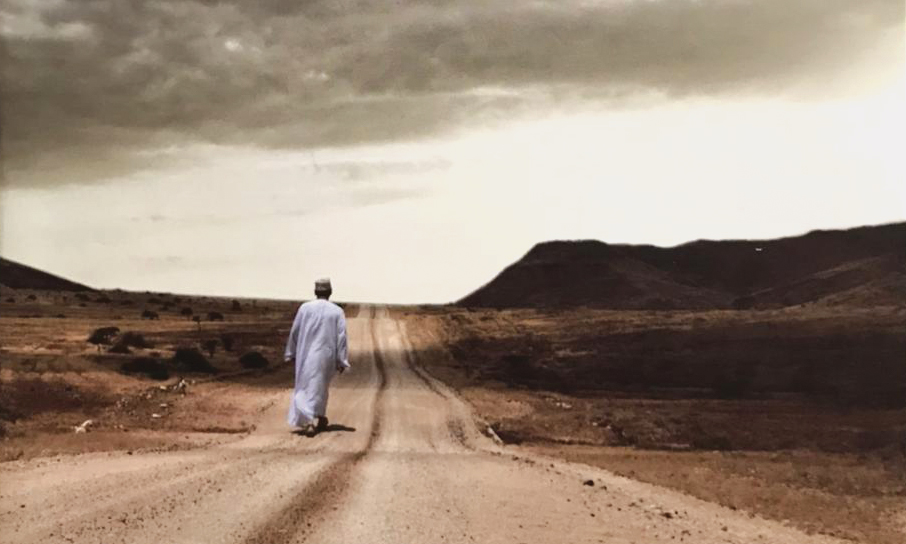

A BOOK REVIEW BY MAGGIE JEANS
Maqbool Hameed al Saleh’s new book is an inspirational, frank and honest account of a life well-lived. It begins by painting a fascinating picture of the harsh reality of life in Oman pre-1970 Muttrah. The author was born in 1945 at the American Mission Hospital which was, at that time, one of only three hospitals in the entire country. Infant mortality was very high and many born did not survive beyond the first year of life.

“At the time, the rule of Sultan Said bin Taimour, who reigned from 1932 to 1970 was characterised as feudal and isolationist (Muscat State Affairs: British Library files, 1948)”.
Life was hard with no infrastructure and donkeys and camels as the main mode of transport and there were none of the modern conveniences which we now take for granted. Few people had electricity and housing was very basic, often lacking decent bathrooms, kitchens & toilets and without running water.
Yet despite these hardships, the author describes a rich community life full of inspirational characters who influenced his future.
Survival was a perpetual struggle with barely enough to eat, malnutrition, illness and poor living conditions. There were no formal schools and reading and writing were taught in Madrassah run in an open warehouse or Godown. Children were required to provide their own chairs from home and notebooks if the family could afford them. These institutions were named after the teacher who owned them and because of them, the Sur Lawati community in Muttrah was relatively well educated. Punishments were harsh and children learnt from their mistakes.
Childhood amusements were limited.
“Swimming in the sea was one of our favourite activities. The energy of the water was overwhelming. The absence of freshwater swimming pools and the need to clean ourselves of the dirt and the stink made us regularly engage in this activity.” (p86)
There were beach games and later field hockey. There were also numerous religious celebrations throughout the year in which youngsters were obliged to participate.
“The nostalgia of childhood and it’s bittersweetness moulds our personalities, characters and dispositions. I doubt if I ever dreamt about my plans, or what I wanted to become. I was completely engrossed with what I had and what I did with it: to live life day by day.” (p89)
The author left school at 14 in 1959 and joined the army. As the eldest son, earning an income to support the family became a necessity. The job involved a 7 km walk daily over rough terrain in the heat although eventually a bicycle was procured — part of the long walk from which the title of the book is derived. This eight years of service in the Sultan’s Armed Forces (SAF) was clearly a formative period for the author’s future career.

Travelling also played an important role in the author’s life. With a group of friends and on very limited means he managed to spend time in India, Kuwait, Iraq, Lebanon and Egypt, travelling by sea and raising funds by trading goods from Oman along the way. Later he was to travel widely throughout the world with his own family.
By 1969, the author was working for what is now Ernst & Young in Abu Dhabi. He was now financially independent and accordingly entered into a very happy arranged marriage and subsequently raised a family of five children. The importance of family and community is a central theme which runs through the entire book.
His career also gathered momentum at this point and he worked in Dubai and Bahrain before beginning his own business in Oman until, in 1971, he joined the Diwan Affairs and eventually became deputy minister and later under-secretary in the Ministry of Social Affairs. The experience gained in these roles was invaluable.
His entrepreneurial instincts were very strong and he established several successful business ventures before finally setting up Oman Holdings Company — OHI.
These initiatives are all detailed in the book, together with the many challenges they presented and the obstacles that had to be overcome to achieve success. The style of this work, written with the help and encouragement of his sister, is refreshingly open, frank and honest. He has the ability to relate episodes that did not go exactly as planned with humour and insight.
There is a short chapter about his passion for boats and long relationship with the sea & fishing culminating in the acquisition of an 88 footer. This is followed by a very amusing chapter about driving a Rolls Royce across France entitled “Adventures & Misadventures”. Finally, there is a thoughtful “Epilogue” and also a “Postscript” with a series of thought-provoking questions and answers. The book also contains a large number of photographs which offer a fascinating glimpse of the past.
The book is full of wisdom & advice for today’s youth. “Formal education does not define our goals and paths. As individuals, we need determination, ambition and faith in our abilities to reach our desired goals.” (p 268)
“A dear friend once told me that we are products of our past but we do not have to prisoners of it! Change is inevitable and we must be willing to let go of the life we planned, to have the life that is waiting for us”. (p 192)
The book is available locally in both English & Arabic from all good booksellers.
Oman Observer is now on the WhatsApp channel. Click here



